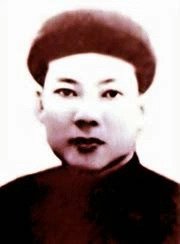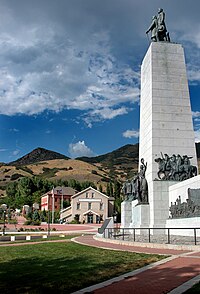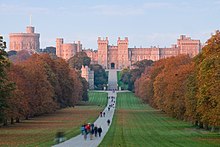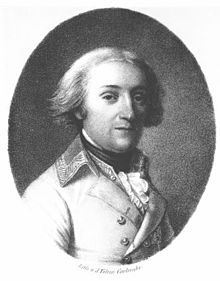Portal:History
The History Portal
History (derived from Ancient Greek ἱστορία (historía) 'inquiry; knowledge acquired by investigation') is the systematic study and documentation of the human past. History is an academic discipline which uses a narrative to describe, examine, question, and analyze past events, and investigate their patterns of cause and effect. Historians debate which narrative best explains an event, as well as the significance of different causes and effects. Historians debate the nature of history as an end in itself, and its usefulness in giving perspective on the problems of the present.
The period of events before the invention of writing systems is considered prehistory. "History" is an umbrella term comprising past events as well as the memory, discovery, collection, organization, presentation, and interpretation of these events. Historians seek knowledge of the past using historical sources such as written documents, oral accounts or traditional oral histories, art and material artifacts, and ecological markers.
Stories common to a particular culture, but not supported by external sources (such as the tales surrounding King Arthur), are usually classified as cultural heritage or legends. History differs from myth in that it is supported by verifiable evidence. However, ancient cultural influences have helped create variant interpretations of the nature of history, which have evolved over the centuries and continue to change today. The modern study of history is wide-ranging, and includes the study of specific regions and certain topical or thematic elements of historical investigation. History is taught as a part of primary and secondary education, and the academic study of history is a major discipline in universities.
Herodotus, a 5th-century BCE Greek historian, is often considered the "father of history", as one of the first historians in the Western tradition, though he has been criticized as the "father of lies". Along with his contemporary Thucydides, he helped form the foundations for the modern study of past events and societies. Their works continue to be read today, and the gap between the culture-focused Herodotus and the military-focused Thucydides remains a point of contention or approach in modern historical writing. In East Asia a state chronicle, the Spring and Autumn Annals, was reputed to date from as early as 722 BCE, though only 2nd-century BCE texts have survived. The title "father of history" has also been attributed, in their respective societies, to Sima Qian, Ibn Khaldun, and Kenneth Dike. (Full article...)
Featured picture
Did you know (auto generated)

- ... that the historic mansion Bulgur Palas in Istanbul hosted a birdhouse for hundreds of domestic canaries in one room during its ownership by the Ottoman Bank?
- ... that in 2007, Arthur Gray's £2 Kangaroo and Map stamp sold for a world record price for a single Australian stamp?
- ... that Timo Meier became the first player in San Jose Sharks franchise history to score five goals in one game when he was 25?
- ... that the course of the Panzer Dragoon series has been said to parallel the history of the Sega Saturn?
- ... that Galena Schoolhouse in South Dakota was once leased to a historical society for $1 annually?
- ... that the historical lands and fishing grounds of the Skinpah were buried underwater by the construction of The Dalles Dam?

Ngô Đình Cẩn (Vietnamese: [ŋo˧ ɗɨ̞̠n˦˩ kəŋ˦˩]; 1911 – 9 May 1964) was the younger brother and confidant of South Vietnam's first president, Ngô Đình Diệm, and an important member of the Diệm government. Diệm put Cẩn in charge of central Vietnam, stretching from Phan Thiết in the south to the border at the 17th parallel, with Cẩn ruling the region as a virtual dictator. Based in the former imperial capital of Huế, Cẩn operated private armies and secret police that controlled the central region and earned himself a reputation as the most oppressive of the Ngô brothers.
In his youth, Cẩn was a follower of the nationalist Phan Bội Châu. In the late 1940s and early 1950s, he worked to organise support for Diệm as various Vietnamese groups and international powers sought to stamp their authority over Vietnam. Cẩn, who succeeded in eliminating alternative nationalist opposition in central Vietnam, became the warlord of the region when his brother became president of the southern half of the partitioned nation in 1955. He became notorious for his involvement in smuggling and corruption, as well as his autocratic rule. Cẩn was regarded as an effective leader against the Viet Cong communist insurgency, which was much weaker in central Vietnam than in other parts of South Vietnam. His Popular Force militia was regarded by US officials in central Vietnam as a successful counter to the communists. (Full article...)
On this day
- 1809 – Napoleonic Wars: In the Bay of Bengal, a French frigate squadron captured three East Indiamen mainly carrying recruits for the Indian Army.
- 1956 – At the Polish embassy in Moscow, Soviet leader Nikita Khrushchev said "We will bury you" while addressing Western envoys, prompting them to leave the room.
- 1999 – Texas A&M University's Aggie Bonfire collapsed (aftermath pictured), killing 12 people and injuring 27 others, and causing the university to officially declare a hiatus on the 90-year-old annual event.
- 2014 – Two Palestinian men attacked the praying congregants of a synagogue in Jerusalem with axes, knives, and a gun, resulting in eight deaths, including the attackers themselves.
- Rose Philippine Duchesne (d. 1852)
- Lise Østergaard (b. 1924)
- Margaret Atwood (b. 1939)
- Chloë Sevigny (b. 1974)
Selected quote
If you wish to avoid foreign collision, you had better abandon the ocean.
— Henry Clay, American statesman
Related portals
More Did you know...
- ... that on 26 April 1881 HMS Doterel (pictured) exploded, killing 143 of the 155 crew members?
- ... that causes of the deaths at the Berlin Wall included shooting, drowning, suffocation, suicide, and falling from a balloon?
- ... that the 19th-century swindler Bertha Heyman, known as "The Confidence Queen," conned men by pretending to be a wealthy woman who was unable to access her fortune?
- ... that only four great uncial codices have survived until the present day?
- ... that after World War II, Polish resistance organizer and Warsaw Uprising fighter Jan Mazurkiewicz was brutally tortured by the authorities in communist Poland?
- ... that tiny Paederus beetles may have caused some of the ten Plagues of Egypt?
- ... that the only known report of bloodshed during the simulated Nazi invasion of Winnipeg was from a woman who cut her thumb while preparing toast?
- ... that Dacian bracelets were used as currency and votive offerings?
Topics
Categories

History • By period • By region • By topic • By ethnic group • Historiography • Archaeology • Books • Maps • Images • Magazines • Organizations • Fictional • Museums • Pseudohistory • Stubs • Timelines • Chronology • People • Wikipedia historians
WikiProjects
![]() WikiProject History •
Ancient Near East • Australian History • Classical Greece and Rome • Dacia • Former countries • History of Canada • Chinese history • European history • Heraldry and vexillology • Indian history • Jewish history • Medieval Scotland • Mesoamerica • Military history • Middle Ages • History of Science
WikiProject History •
Ancient Near East • Australian History • Classical Greece and Rome • Dacia • Former countries • History of Canada • Chinese history • European history • Heraldry and vexillology • Indian history • Jewish history • Medieval Scotland • Mesoamerica • Military history • Middle Ages • History of Science
WikiProject Time • Days of the Year • Years
WikiProject Biography • Composers • Political figures • Saints • United States Presidents
Things you can do
 |
Here are some tasks awaiting attention:
|
Associated Wikimedia
The following Wikimedia Foundation sister projects provide more on this subject:
-
Commons
Free media repository -
Wikibooks
Free textbooks and manuals -
Wikidata
Free knowledge base -
Wikinews
Free-content news -
Wikiquote
Collection of quotations -
Wikisource
Free-content library -
Wikiversity
Free learning tools -
Wiktionary
Dictionary and thesaurus






















































